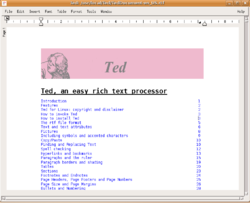 Screenshot of Ted 2.17 | |
| Developer(s) | Mark de Does |
|---|---|
| Initial release | 9 November 1998;[1] or 10 October 1998[2] |
| Stable release | 2.23[3] |
| Written in | C |
| Operating system | Unix, Linux |
| Size | 3.0 Mb (.deb package) |
| Type | Word processor |
| License | GPL-2.0-only |
| Website | www.nllgg.nl/Ted |
Ted is a lightweight free software word processor for the X Window System, and runs on Linux and other Unix-like systems. Developed primarily by Mark de Does, it's licensed under the terms of the GNU General Public License (GPL-2.0-only), and has been translated into several languages.
While Ted is small in size, it is a full-featured and fast word processor, making it ideal for older computers and embedded systems.
It saves files in a Microsoft Word-compatible rich text format, and has support for headers, footers, tables, different fonts, text alignment, and other features common in word processors. The built-in spellchecker is not automatic, whereby incorrect words are not highlighted when typing.
Until version 2.17, Ted used the Motif toolkit exclusively for widget rendering. LessTif also worked. The current version (2.23) uses the GTK+ toolkit by default. It can still be built with Motif or LessTif, if desired.
The Ted package had been included in Debian ("etch"),[4] in Ubuntu up to Hardy Heron,[5][6] and Gentoo Linux, and is available from the official homepage in various package formats.[7]
YouTube Encyclopedic
-
1/3Views:701 250417 4458 170
-
How computer memory works - Kanawat Senanan
-
Geordie Rose - Quantum Computing: Artificial Intelligence Is Here
-
Chris Anderson: "TED Talks: The Official TED Guide to Public Speaking" | Talks at Google
Transcription
See also
References
- ^ de Does, Mark (2013-02-04). "Ted 2.23, an easy RTF text processor for Linux/Unix released". The Netherlands: NLUUG. Retrieved 2020-05-27.
First release (Ted 2.0: November 9, 1998)
- ^ "Linux Software Map" (2.4 Mb). ftp.pwr.wroc.pl. 1999-08-29. Retrieved 2020-05-27.
Version: 2.0; Entered-date: 10OCT98
- ^ Error: Unable to display the reference properly. See the documentation for details.
- ^ "ted (2.17-1)". Debian Packages. SPI Inc. Archived from the original on 2011-06-05. Retrieved 2010-02-04.
- ^ "Publishing history of ted package in Ubuntu". Launchpad. Canonical Ltd. 2015-04-30. Retrieved 2020-05-27.
- ^ "ted 2.17-1ubuntu1 source package in Ubuntu". Launchpad. Canonical, Ltd. 2008-01-12. Retrieved 2020-05-27. — The page lists links to builds of binary (.deb) packages of various processor architectures.
- ^ "app-editors/ted-2.23". Gentoo. Retrieved 2014-04-15.
